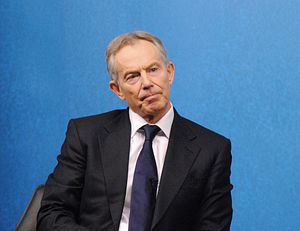Late last month, the Kazakhstani government learned that its greatest advocate in the West was closing shop. According to a statement from Tony Blair, the former British prime minister has decided to shutter Tony Blair Associates and its associated Firerush and Windrush financial structures. With the announcement, Blair is not only winding down his primary vehicle for international consultancy, but he’s also ending a relationship with Astana that’s proven as lucrative as it’s been embarrassing.
Blair first hitched with the Kazakhstani government in 2011, brought aboard as an “official adviser” to Astana. Pledging to focus on EU-inspired “reforms,” Blair painted his relationship with the Kazakhstani government in a professional light, with the British former prime minister there to serve as a font of advice, and as a means for bringing Kazakhstan that much closer to the democratized goals President Nursultan Nazarbayev — then entering his third decade in power — supposedly aspired to.
It soon became clear, though, that Blair’s focus on putative “reforms” would take an immediate and, over the next five years continued, backseat to spinning the Kazakhstani government’s entrenching dictatorship. (There was a reason, after all, that Astana’s real goal in hiring Blair was rumored to be earning Nazarbayev a Nobel Peace Prize.) Indeed, over the past five years, Kazakhstan saw no greater cheerleader abroad than Blair and his team. Time and again, Blair rushed to the Kazakhstani government’s defense, be it after the 2011 government-led Zhanaozen massacre or after Astana had snuffed any remaining opposition, either political or press.
Five years on, it’s difficult to catalog all of the moments Blair whitewashed the Nazarbayev regime’s continued rule either via obfuscation or outright falsity. To wit, after coming aboard, Blair claimed Kazakhstan was the lone nation to give up nuclear weapons — blatantly ignoring moves to give up nuclear weaponry in both Ukraine and Belarus. In 2011, Blair also stated that Kazakhstan was “almost unique, I would say, in its cultural diversity and the way it brings different faiths together, and cultures together.” He further regurgitated Astana’s talking points in Wall Street Journal and Vanity Fair. And just last year — as Nazarbayev was busy taking 98 percent in the country’s latest (flawed) presidential election — Blair said that Kazakhstan’s leadership was “trying to do the right thing.”
But perhaps Blair’s most embarrassing — or shameful, depending on your perspective — moments came amidst the fallout from 2011’s Zhanaozen massacre, in which government forces killed more than a dozen unarmed protesters. Following the killings, Blair wrote a letter to Nazarbayev carrying advice as to how the Kazakhstani president should spin the slaughter. Instead of accepting responsibility, or pledging further reform, Blair proposed a different tack: convincing the West that the killings “should not obscure the enormous progress” Nazarbayev had apparently brought to Kazakhstan. Blair then included a further 500 words for Nazarbayev to use, becoming, in effect, a speechwriter — and cheerleader — for Nazarbayev. Earlier this year, it was further revealed that Blair had approved an additional letter that would have Astana claim the impossibility of bringing impartial, independent experts to Zhanaozen, and defending the Kazakhstani government’s investigation into the massacre.
In his five-year tenure with Kazakhstan, Blair never confirmed the rumored finances swirling his relationship with Astana, saying that any financial remuneration — from $13 million to $27 million annually — remained “obviously confidential.” Whatever the final price tag, it’s clear that Blair’s network profited handsomely while he remained close to the Kazakhstani government. Not only did Portland Communications, a PR shop founded by Blair’s former public relations chief and later accused of manipulating Wikipedia entries to whitewash Nazarbayev’s image, end up as Kazakhstan’s lone commercial representation in the United States, but Blair’s wife’s law firm received millions to review Kazakhstan’s “bilateral investment treaties.”
All told, Blair’s tenure with Kazakhstan led the former prime minister to become Astana’s most outspoken defender in the West, a role that paralleled and abetted Kazakhstan’s slide into full-throated dictatorship. With Blair attached, Kazakhstan not only became the lone nation with its Soviet-era head still leading the government, but the country dropped a breathtaking 18 slots in Transparency International’s Corruption Perceptions Index along the way. And now, as Blair pulls back from Kazakhstan, Astana staggers into its first recession in nearly two decades – leaving Kazakhstan without its greatest Western advocate, at the worst time.
No stain will leave a greater blot on Blair’s legacy than the Iraq War, but his time serving at the behest of the Kazakhstani government should not be forgotten. Not only did Blair do more than any other Westerner to defend Astana’s legacy of repression over the past few years, but he helped spear and lend credence to a pattern of former Western officials selling their reputations to the highest bidder, despotism be damned.
Blair never elucidated a clear defense of his record with Astana, leaving The New York Review of Books’ Geoffrey Wheatcroft to recently offer a bit of tautological psychoanalysis: To Blair, “whatever he does must be virtuous because he does it.” Blair may have had some form of virtuousness in mind when he latched onto Astana. But five years on, whatever high hopes he may have had were replaced by craven spin, clear obfuscation, and a regime that is that much closer to the dictatorial model Blair once went to war to stop and which, in Kazakhstan, he helped entrench that much further.

































